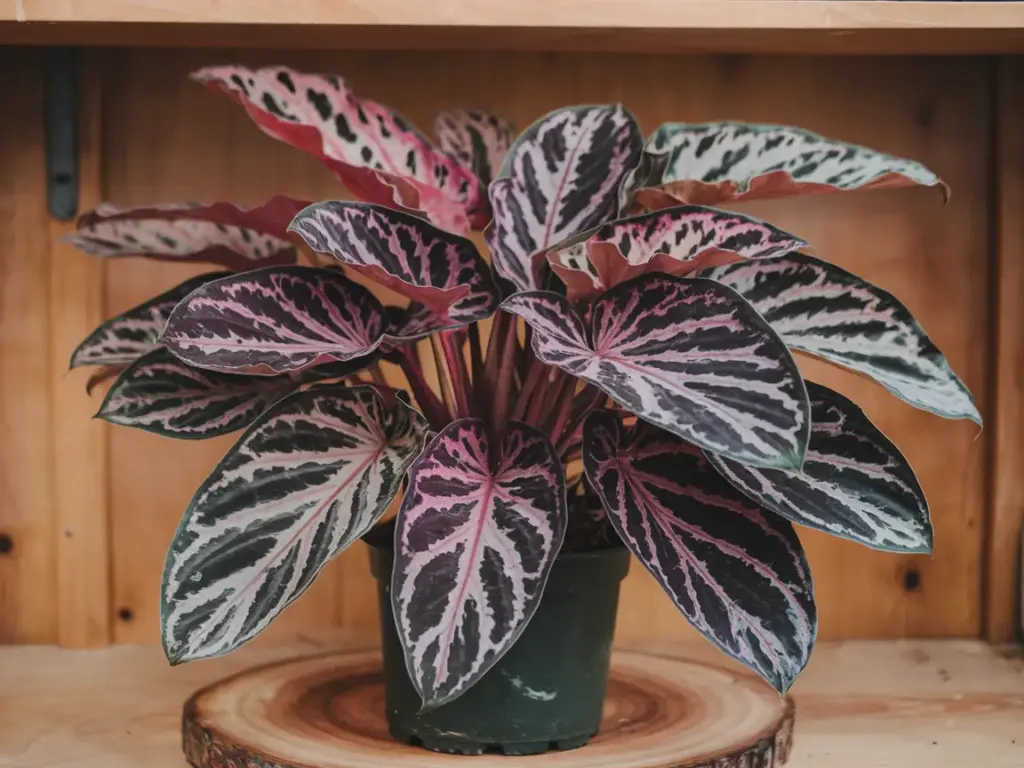12. Calathea Rufibarba (Furry Feather)

When I first touched a Calathea rufibarba, I couldn’t believe its texture! Unlike its smooth-leaved cousins, this unique plant feels like stroking a soft feather. After growing several of these fuzzy beauties over the years, I’ve discovered that while its texture might be unusual, it’s actually one of the more forgiving Calatheas in terms of care.
The Unique Fuzzy Texture
What makes the Furry Feather truly special:
- Velvety fuzz covering both sides of leaves
- Long, narrow leaves that wave and ripple
- Deep green top surface with burgundy undersides
- Leaves that feel like actual velvet or suede
Fun fact: That fuzzy texture actually helps the plant collect and distribute moisture naturally!
Perfect Growing Conditions
Through trial and error (and lots of texture-touching), I’ve found the ideal environment:
- Light: Bright indirect light with some morning sun tolerance
- Humidity: 50-60% (less fussy than other Calatheas!)
- Temperature: Thrives between 65-80°F (18-27°C)
- Soil: Light, airy mix with extra orchid bark
Understanding Growth Patterns
Here’s what to expect from your Furry Feather:
- Height: Can reach 2-3 feet tall
- Spread: Usually 1-2 feet wide
- Growth rate: Moderate to fast
- Leaf production: New leaves emerge fuzzy and curled
Essential Care Guide
My proven maintenance routine includes:
- Water when top inch feels dry
- Light dusting with a soft makeup brush
- Monthly feeding during growing season
- Quarterly pot rotation for even growth
- Regular humidity checks
Pro tip: Never mist this plant – those fuzzy leaves can trap water and lead to fungal issues!
Solving Common Challenges
Let me share my biggest rufibarba revelation – I once discovered that yellow leaves weren’t from overwatering, but from mineral buildup. Here’s what I’ve learned:
- Brown leaf tips: Usually water quality issues
- Matted fuzz: Often from water droplets
- Fading color: Typically light-related
- Yellow leaves: Check for mineral buildup
- Crispy edges: Humidity too low
Expert Growing Tips
Want to master Furry Feather care? Here’s my secret sauce:
- Use distilled or filtered water only
- Clean leaves with dry brush only
- Provide good air circulation
- Keep away from windowsills
- Group with other tropicals
Special Texture Maintenance
Caring for those fuzzy leaves requires special attention:
- Use soft makeup brush for cleaning
- Never wet the leaves directly
- Inspect fuzzy texture weekly
- Remove dust regularly
The game-changer? Understanding that the fuzz is part of the plant’s natural defense system!
Ready to explore a stunning variegated beauty? Up next, we’ll discover the Calathea Beauty Star with its dramatic silvery stripes that look like shooting stars across the leaves! Click the next button below to learn why this eye-catching variety might be the perfect addition to your collection, and discover my secrets for keeping those striking patterns vibrant!









GIPHY App Key not set. Please check settings